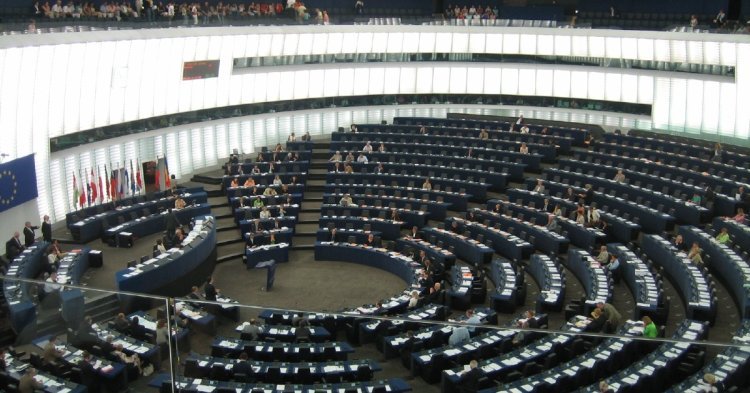Past efforts
On the initiative of Andrew Duff, the Constitutional Affairs Committee of the European Parliament repeatedly called for a transnational constituency of 25 MEPs during the 2009–2014 parliamentary term, but there was no luck in the plenary chamber. However, that was of course before the Brexit referendum presented a new opportunity for the reform.
In November 2015, still before the Brexit referendum, the Parliament adopted a resolution on reforming the electoral law of the EU. Andrew Duff writes that in the resolution, the Parliament “finally voted to support a joint list”.[1] In the annex to the resolution, it is proposed that the line, “The Council decides by unanimity on a joint constituency in which lists are headed by each political family’s candidate for the post of President of the Commission”, be adopted in a Council decision.
This was not enough for the Greens, who are in favour of transnational lists. In the aftermath of the November 2015 resolution, against which the Greens voted, their vice-president Josep Maria Terricabras deplored the missed opportunity to send a clear signal in support of designating a proportion of seats for European lists.
As Andrew Duff notes, in April 2017 the European Parliament referred to transnational lists again in a Brexit-related resolution, where it reiterated its commitment to reforming the electoral procedure on the basis of the earlier resolution.
More advocacy is needed
This is the best chance we’ve had to create a transnational constituency. In addition to Brexit, the supportive stance of French President Emmanuel Macron, among others, contributes to this. The transnational constituency would have the potential to bring genuinely European issues to the fore in European elections, as up to nearly a tenth of the seats would be occupied by politicians with a European mandate. At least not everyone could spend their campaign talking about what their national government is doing, or about their home country’s foreign policy. One could also expect this to push the national and regional candidates to focus on what’s relevant for the European election. Additionally, as each citizen would have two ballots instead of one, the novelty could energise the election and increase the turnout.
More informed voting, bigger turnout. Moreover, with transnational lists each citizen could exercise scrutiny over more MEPs than before. A Finnish voter could vote for or against 13 MEPs in 2014. In 2019 the number could be 86. From the point of view of democracy, transnational lists are a worthy cause, and democracy is what elections are all about.
The issue of what happens to the British seats will have to be addressed sooner or later, but simply removing the seats altogether appears to be the default option. Academics and politicians I have discussed with all find it unlikely that transnational lists will come into being, or think that present efforts are insufficient. In April, Politico Europe called the idea “utopian”.
No wonder. Public discussion on the topic has been scarce, even though there is a clear proposal to be made. We need more prominent European politicians and public figures to make the case for reform. In the 2019 European election, there must be a EU-wide constituency of 73 MEPs. Some may propose a constituency of a smaller size, which would allow for reducing the size of the parliament to an extent, but there is ample reason to be ambitious. There will be plenty of others out there to try to water down the idea. Indeed, that is the only thing we don’t have to do ourselves.
The debate on transnational lists is a part of a wider discussion on the allocation of seats in the European Parliament, a key question being the just representation of each citizen, considering the (intentional) overrepresentation of smaller member states. In the Politico Europe article it is argued that other seemingly easy alternatives would increase the inequality of representation among citizens. This would be the case for both removing the 73 British seats altogether, and potentially for distributing them among the remaining EU27. Transnational lists may be called lofty or unrealistic, but these alternatives have their own disadvantages.
A proposal for reallocation that would reduce this inequality, the Cambridge Compromise, has been made, but that alone would of course not bring about the other benefits of transnational lists. A 73-member European constituency would also increase the equality of citizens in the European Parliament, although to a lesser extent than the Cambridge Compromise.[2] In May, Andrew Duff proposed the introduction of both the Cambridge Compromise and transnational lists, options that need not be mutually exclusive.[1]
The time is now
Who wants transnational lists, must act now – better not wait until the next country is leaving the EU. This week I plan to contact my MEP, voice my support for the idea and ask what more an ordinary citizen could do. In the name of democracy and European citizenship, I recommend others to do the same.
Footnotes
[1] Duff, Andrew: The rise of post-national democracy: Macron, Brexit and the electoral reform of the European Parliament. May 10, 2017. European Policy Centre.
[2] Kalcik, Robert & Wolff, Guntram: Is Brexit an opportunity to reform the European Parliament? January 27, 2017. Bruegel.





Follow the comments: |
|
